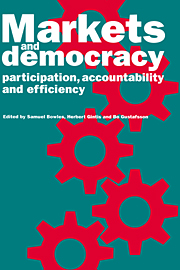Book contents
- Frontmatter
- Contents
- List of figures
- List of tables
- Preface
- 1 Post-Walrasian political economy
- Part I Agency, incentives, and democratic accountability
- Part II Institutions and institutional change
- Part III Conditions for the success of the democratic firm
- Part IV Productivity, distribution, and power
- Part V Ownership, participation and capital markets
- 14 The motivational role of an external agent in the informationally-participatory firm
- 15 Unstable ownership
- 16 The simple analytics of a membership market in a labor-managed economy
- Part VI Political democracy and economic democracy
- Bibliography
- Author index
- Subject index
15 - Unstable ownership
Published online by Cambridge University Press: 05 March 2012
- Frontmatter
- Contents
- List of figures
- List of tables
- Preface
- 1 Post-Walrasian political economy
- Part I Agency, incentives, and democratic accountability
- Part II Institutions and institutional change
- Part III Conditions for the success of the democratic firm
- Part IV Productivity, distribution, and power
- Part V Ownership, participation and capital markets
- 14 The motivational role of an external agent in the informationally-participatory firm
- 15 Unstable ownership
- 16 The simple analytics of a membership market in a labor-managed economy
- Part VI Political democracy and economic democracy
- Bibliography
- Author index
- Subject index
Summary
Introduction
Many countries seem to favor mixed ownership as a way to make firms democratic. Employees are therefore induced to buy shares in the firm where they work. Among other things, this may reduce the conflict between labor and capital as both groups get interests as shareholders in the firm.
A crucial point for the proposers is often that the shares should be purchased and held by the individual worker, not by an organized group of workers. There should, for example, be no restrictions on each employee's trade of shares. A free individual purchase and sale of shares, however, may be inconsistent with a stable mixed ownership structure. Employee-owners may have the opportunity to avoid equal profit-sharing with the other owners. They can, for example, allocate the income of the firm to higher wages and fringe benefits for themselves, instead of paying out profit to all the shareholders. To pursue their own interests in the firm, the employees need the majority of shares. As a consequence, the external owners also want the majority of shares to prevent a non-value-maximizing policy. Hence, there may be a struggle for control over the firm between the two groups.
The conflict may not be solved through a free market for shares and a market for corporate control. On the contrary, restrictions on the trading of shares may be necessary to obtain a stable ownership structure. The initial majority owners as a group have no interest in selling their control over the firm for less than a full compensation for their loss from the takeover. However, there is a conflict between collective and individual rationality.
- Type
- Chapter
- Information
- Markets and DemocracyParticipation, Accountability and Efficiency, pp. 248 - 259Publisher: Cambridge University PressPrint publication year: 1993
- 4
- Cited by

